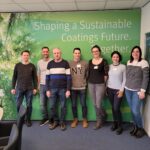On 14th March 2023 the HE project IRISS organised an online informative session about how the IRISS project applies the Safe-and-Sustainable-by-Design (SSbD) framework in value chains and SMEs. The workshop was held by the Sustainable and Safe by Design Work Group of the Spanish SusChem (SusChem-ES). Mrs. Anne Chloé (Cefic – European Chemical Industry Council) explained that this project aims to connect, synergize and transform the SSbD community in Europe and globally towards a lifecycle approach.
The workshop was visited by about 25 people coming mainly from SMEs and technological centers.
NanoPAT partners (Laura Torres from Analisis-DSC and Blanca Suarez from TEMASOL) participated in the event. NanoPAT sees a big potential in the IRISS project to see the different aspects that arise in the nanotechnology sector related to SSbD: about policies implemented, research taking place and recommendations on how to implement SSbD in industries, the challenges to be faced, etc. Case studies will be incorporated in the months of May and June 2023, at that moment they are opening the application period for those who want to get involved in the project.
Under the name “International ecosystem for accelerating the transition to Safe-and-Sustainable-by-Design materials, products and processes”, IRISS , is a three-year Horizon Europe project which started on 1st June 2022. It has a budget of €4.3 million, of which approximately €3.5 million come from the EU, as well as additional funding through the University of Birmingham and Swiss Federal Laboratories for Materials Science and Technology. The consortium consists of 20 partners, coordinated by IVL Swedish Environmental Research Institute. The project responds to meet the EU Green Deal, EU Chemicals Strategy for Sustainability, and UN Sustainable Development Goals. Fundamental is the concept of Safe-and-Sustainable-by-Design, SSbD, which includes focusing early in the supply chain on providing products that are part of circular models while avoiding properties that may be harmful to human health or the environment. It integrates circularity, climate neutrality, functionality and safety of materials, products and processes throughout their life cycle.
In close collaboration with industry, a number of roadmaps will be developed to implement research and innovation, but also to demonstrate needs that exist in the policy area. Focus is on the value chains for textiles, construction, electronics, energy, automotive and packaging. These value chains are coordinated by Cefic and different SusChem’s Technology National Platforms (NTPs), more in detail for the electronic industry is where the nanotechnology SusChem’s NTP is collaborating and giving support. The International Iberian Nanotechnology Laboratory (INL) from Portugal is engage in mapping of value chain stakeholders and defining major safe and sustainability challenges for the electronic industry.



